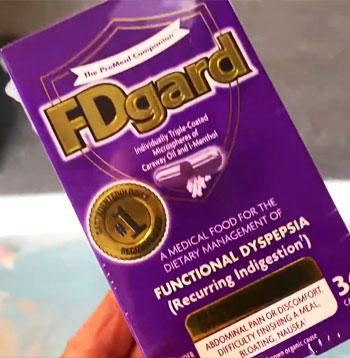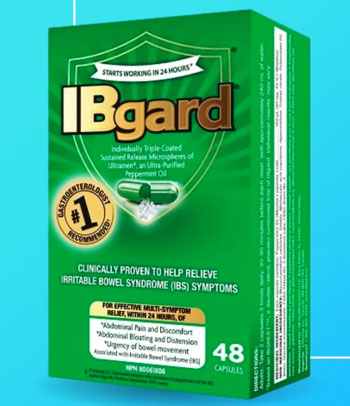Irritable bowel syndrome (IBS) is a common gastrointestinal disorder that affects the large intestine. Symptoms include abdominal pain, bloating, diarrhea, and constipation. FDgard and IBgard are two over-the-counter medications used to help manage IBS symptoms.
This article provides an in-depth comparison of FDgard and IBgard, examining their key features, pros and cons, differences, and frequently asked questions.
A Brief Comparison Table
| Aspects | FDgard | IBgard |
| Active Ingredient | Simethicone | Peppermint Oil |
| Dosage Form | Chewable tablet | Capsule |
| Approved Use | Abdominal discomfort from gas | IBS symptoms |
| Onset of Action | Within minutes | 30-60 minutes |
| How Taken | Chewed before meals | Swallowed whole |
| Frequency | Up to 2 tablets, 3 times daily | 2 capsules, 2-4 times daily |
| Drug Interactions | Minimal | Peppermint oil can enhance effects of cyclosporine |
| Side Effects | Rare, mild | Heartburn, headache, anal/perianal burning or itching |
| Cost | $$ | $$$ |
| Available | OTC | OTC |
Overview of FDgard

FDgard is a medical food intended to help relieve abdominal discomfort from extra gas in the stomach and intestines. Its active ingredient is simethicone, an over-the-counter anti-foaming agent that helps break up gas bubbles.
Key features of FDgard include:
- Chewable tablet form – allows simethicone to mix with saliva and coat the GI tract
- Fast onset of action – starts working in minutes to reduce bloating and pressure
- Taken before meals – helps prevent gas buildup from eating
- Minimal drug interactions or side effects
- Can provide quick relief during flare-ups of abdominal discomfort
- Not intended for long-term daily use
FDgard is convenient to take as needed for gas-related symptoms of IBS. It does not require a prescription. The recommended dosage is 1-2 tablets, up to 3 times daily.
Overview of IBgard
IBgard is a medical food specially formulated for the dietary management of IBS. Its primary ingredient is peppermint oil, which contains compounds that help relax intestinal smooth muscle.
Key aspects of IBgard include:
- Triple-coated capsules – deliver peppermint oil past the stomach to intestines
- Helps relieve abdominal pain, bloating, diarrhea
- Can reduce total IBS symptoms by up to 54%
- Takes 30-60 minutes to start working
- Taken 2 capsules, 2-4 times per day as needed
- May be used daily for up to 8 weeks
- More side effects than FDgard
- More expensive than FDgard
- Does not require a prescription
IBgard is intended for longer term daily use to control the overall symptoms of IBS.
Also Read: Comparison Between Refresh Relieva and Refresh Contacts
Key Differences Between FDgard and IBgard
FDgard and IBgard take different approaches to managing IBS symptoms. The main differences are:
Active Ingredients

FDgard and IBgard serve as remedies for gastrointestinal issues, but they contain different active ingredients.
- FDgard: The main ingredient in FDgard is simethicone. Simethicone is a compound used primarily to break up gas bubbles in the stomach and intestines. By doing this, it can help alleviate the discomfort and bloating that comes from having excess gas.
- IBgard: The chief ingredient in IBgard is peppermint oil. Peppermint oil has a long history of use for digestive issues. It can help to relax the muscles of the intestines, which may alleviate symptoms like abdominal pain and spasms.
Onset and Duration
How quickly these products work and how long their effects last are crucial considerations for those seeking relief.
- FDgard: FDgard acts swiftly. Within a few minutes of taking it, many people notice a reduction in their bloating and the discomfort they feel from gas. Its quick action is what makes it such a valuable tool for on-the-spot relief.
- IBgard: IBgard takes a bit longer to show its effects, typically between 30 to 60 minutes. However, once it starts working, its impact can last up to 2 hours. This longer duration can provide extended relief from IBS symptoms, which can be beneficial throughout the day.
Usage
How and when you should use these products differ based on their intended purposes.
- FDgard: FDgard is designed for on-demand use. This means you take it when you feel symptoms coming on. Specifically, if you anticipate a meal might cause gas or discomfort, you can take FDgard right before eating. However, it’s not meant for everyday, regular use as a preventive measure.
- IBgard: This product is intended for more consistent use. Those who benefit from IBgard typically take it 2-4 times per day. Some people might need to use it for up to 8 weeks to see the best results in managing their IBS symptoms.
Side Effects
With any product or medication, there’s always a chance of side effects.
- FDgard: Because simethicone operates mainly in the digestive tract and isn’t absorbed into the system in significant amounts, side effects with FDgard are uncommon.
- IBgard: Due to its peppermint oil content, some users might experience minor side effects. These can include heartburn, which is a burning sensation in the chest. Some people might get a headache, while others might feel a bit of irritation in the anal or perianal area. It’s worth noting that many users don’t experience these side effects, but it’s good to be aware of them.
Cost
Budget considerations can influence which product someone might choose.
- FDgard: Generally, FDgard is the more affordable option between the two. A month’s supply might cost you between $20 to $30, depending on where you purchase it.
- IBgard: On the other hand, IBgard tends to be pricier. A month’s supply can often exceed $50. The difference in cost might be due to the formulation or the extensive research behind IBgard.
Also Watch This Review Video:
Appropriate Uses
Both products have their ideal scenarios for use based on their properties.
- FDgard: If you’re someone who experiences sudden bouts of gas, bloating, or discomfort after certain meals, FDgard might be your go-to. It’s quick-acting and best for those instances when you need relief right away.
- IBgard: If you have been diagnosed with IBS or have symptoms like pain, diarrhea, and constipation, IBgard might be the better choice. Its formulation is meant for more regular use to manage a range of IBS symptoms.
Interactions
Interactions refer to how these products might affect or be affected by other medications or conditions.
- FDgard: FDgard’s active ingredient, simethicone, has minimal interactions with other medications. This is because it works locally in the digestive system and doesn’t get absorbed into the bloodstream in significant amounts.
- IBgard: The peppermint oil in IBgard might interact with some medications. For instance, cyclosporine, an immunosuppressant drug, could have its effects enhanced by peppermint oil. It’s always wise to discuss with a healthcare professional before combining any treatments.
FDgard provides rapid relief of gas-associated symptoms as needed, while IBgard works to control overall IBS symptoms with daily use. FDgard is faster, cheaper, and safer, but only treats gas issues. IBgard takes longer to work but helps manage global IBS problems.
Also Read: Comparison Between the Systane Nighttime Gel and Ointment
Frequently Asked Questions (FAQs)
Some alternatives to IBgard include enteric-coated peppermint oil capsules, antispasmodics like dicyclomine, rifaximin for IBS-D, fiber supplements, probiotics, and FDgard for gas symptoms. Lifestyle changes like stress management and diet modification can also help manage IBS.
FDgard contains simethicone, an oral anti-foaming agent that helps break up gas bubbles in the stomach and intestines. This reduces bloating, abdominal pressure/discomfort, and flatulence caused by intestinal gas from food, swallowing air, or digestive issues.
IBgard is used to help treat the multiple symptoms of irritable bowel syndrome, including abdominal pain, bloating, diarrhea, and constipation. It contains peppermint oil which relaxes intestinal smooth muscle spasms and cramping.
IBgard can be used daily for up to 8 weeks, based on the manufacturer’s recommendations. There is some risk of minor side effects like heartburn with prolonged used of peppermint oil supplements. Check with your doctor before taking IBgard daily.
Also Read: Differences Between IBgard And Heather’s Tummy Tamers.
Final Thoughts
In conclusion, FDgard and IBgard take different approaches to managing IBS. FDgard offers fast relief from gas-related symptoms, while IBgard works over a longer time frame to control overall IBS problems. FDgard is less expensive but only treats gas issues, not global IBS symptoms.
Talk to your doctor to determine which option may be appropriate for your individual case. Proper diet, stress management, and lifestyle modifications should also be part of any comprehensive IBS treatment plan.
